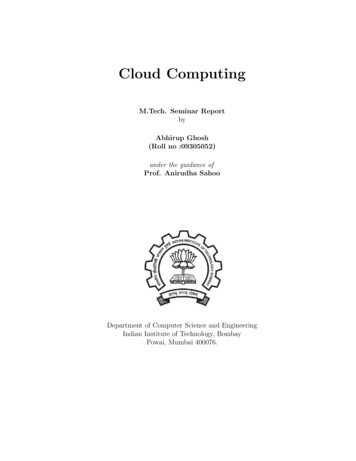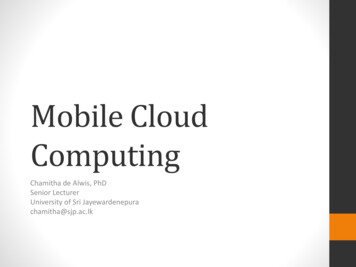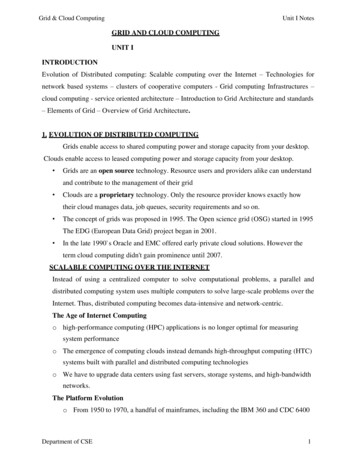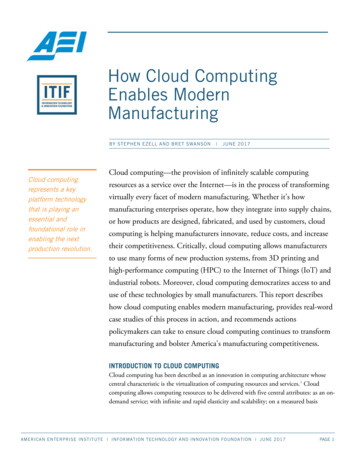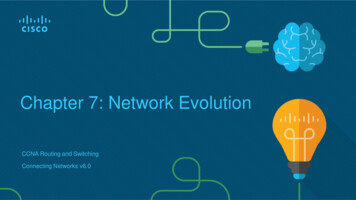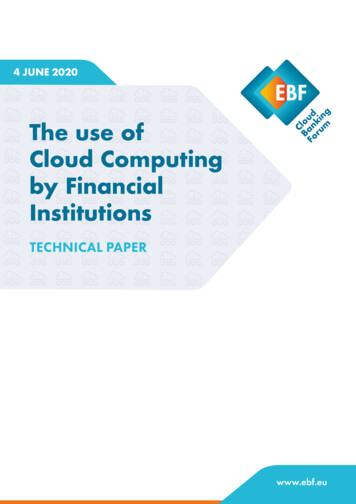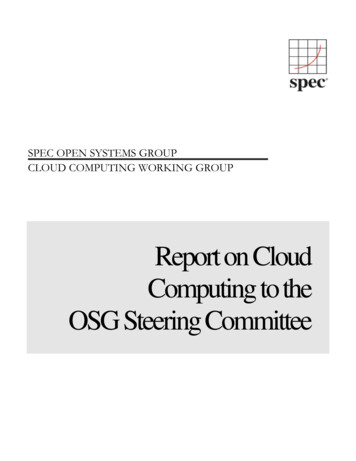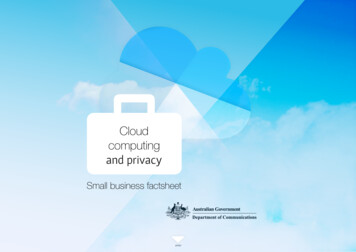
Transcription
Cloudcomputingand privacySmall business factsheetenter
What is Cloud computing?Cloud computing is the delivery of ICT services over the internet on demand. Consumersno longer need to buy, build or install expensive computer systems. Users can insteadaccess computing resources as a utility service via a wired or wireless network – fromthe cloud. Cloud computing is already a major part of many people’s lives. Services suchas Google Maps, Apple iTunes, and webmail services including Gmail and Hotmail are alldelivered through cloud computing.Cloud computing can offer a range of benefits to small business by offering securityimprovements, cost savings, improved reliability, and access to services and data frommultiple devices.2Department of CommunicationCloud computing myths
Privacy and the cloudSome of the perceived risks associated with small business using the cloud often relateto issues of privacy. Like all ICT, using cloud computing is a question of taking advantageof the benefits while managing the potential risks.This factsheet provides advice on how privacy legislation applies to cloud computing.It contains some privacy-related questions you may want to ask your cloud serviceprovider to help you make an informed and confident decision for your business.In addition to providing information on how your business is protected when usingthe cloud, this factsheet also outlines your legislative obligations as a small business toprotect personal information that may be in your care.Legislative protectionsIn Australia, there are two key laws that provide protections when using cloud services.Even if your cloud provider is based overseas, these laws may still apply although theycan be more difficult to enforce in these situations.3Department of CommunicationCloud computing myths
The Privacy Act 1988The Privacy Act 1988 (Privacy Act) regulates the handling of personal information by businesses withan annual turnover of more than 3 million, and certain smaller businesses including health serviceproviders and businesses that trade in personal information1.Personal information is any information or opinion that identifies an individual2. This includes informationthat could be ‘reasonably used’ to identify someone, such as a telephone number in many cases.Businesses are subject to the obligations set out in the ‘Australian Privacy Principles’ or ‘APPs’.1 Further advice on entities covered by the privacy Act can be found on the OAIC website here.24This is a simplified definition. A complete definition can be found here on the OAIC’s website.Department of CommunicationCloud computing myths
There are some circumstances where the Privacy Act may not apply Cloud providers must take reasonable steps to secure personal datato your cloud service provider, for example when the cloud servicefrom misuse, interference or loss and from unauthorised access,provider is a small business with an annual turnover of less thanmodification or disclosure (APP 11); 3 million. If you are in doubt, remember to ask your cloud serviceprovider for details and shop around for the service that suits you best.Businesses covered by the Privacy Act are subject to the obligationsset out in the ‘Australian Privacy Principles’ or ‘APPs’. The APPsgenerally apply to entities that hold personal information. In thecontext of cloud computing, key obligations include the following: The privacy policies of cloud providers must state the intendeddisclosure arrangements of personal information, including to anyoffshore storage destination/recipients (APP 1); Cloud providers can only disclose personal information to aperson or organisation outside Australia where they have taken Cloud providers must take reasonable steps to delete or de-identifypersonal information that is no longer needed for the purpose forwhich it was collected (APP 11).Remember that the Privacy Act may apply even if your provider isbased overseas, and even if your contract with the provider says that adifferent law applies.As a small business, even if you are not bound by the obligationsin the Privacy Act, privacy should be an important consideration indealing with your customer’s information. Lack of adequate privacyprotections could affect your business’ reputation.reasonable steps to ensure the overseas recipient does not breachThe Office of the Australian Information Commissioner (OAIC) isthe protections afforded under Australian privacy law. Further,responsible for enforcing the Privacy Act. Further information oncloud providers remain legislatively accountable for unauthorised orthe protections within the Privacy Act, including how you can makeinadvertent data security breaches that may occur offshore (APP 8);a complaint for a suspected breach of the Act, can be found on the Cloud providers must give an individual access to personal data heldOAIC’s website.about them upon request – and take reasonable steps correct anypersonal data if required (APP 10, APP 12, APP 13);5Department of CommunicationCloud computing myths
Australian Consumer LawSmall business consumers of the cloud remain protected by theoverarching consumer protection framework that applies to allgoods and services in Australia – the Australian Consumer Law (ACL).The ACL is technology neutral and provides protection against: false or misleading representations; unconscionable conduct; and product guarantees.If a cloud service provider claims that a certain level of protectionwill apply to your data, and fails to live up to its promise, it mightbe in breach of the ACL. For more information about how the ACLmight apply to a cloud service, have a look at the Legal tips forsmall businesses using cloud services factsheet, developed by theDepartment of Communications.The ACL is enforced jointly by the Australian Competition andConsumer Commission (ACCC) and fair trading bodies in each stateand territory. Further information on the ACL, including how to makea complaint, is available at www.consumerlaw.gov.au.6Department of CommunicationCloud computing myths
Key considerations forsmall businessPrivacy specific questions you may wish to ask your cloud serviceprovider include:Where will my data be stored? If you, or your customers, have a preference for onshore storageBy using a cloud service you will be entering into a contract. In mostcases this contract will set out the obligations that the provider hascommitted to. As with most ICT services, a cloud computing contractmay be ‘standard form’ with little opportunity to negotiate specificterms and conditions.options, your provider should be able to clearly inform you of thephysical location of their intended data storage facilities. You shouldbe aware that different countries have different laws that mayallow access to stored data for purposes of law enforcement andnational security.Before you agree to the terms and conditions, you should considerwhether they satisfy your expectations and meet your specificbusiness needs. This can be more important than comparing theprice of two or more services. You should think about the specificneeds that apply to the type of information you will be storing, thecontractual details, and the privacy policies of the cloud serviceprovider you are considering. It may be useful to discuss with apotential cloud service provider your data security needs to ensurethat they will apply appropriate levels of protection to the information.Before choosing a cloud service, shop around, compare services,read terms and conditions and ask your potential provider questions.For a more complete list of questions see Questions to ask yourCloud Provider.7Department of CommunicationCloud computing myths
Do you offer personalised encryption services for my data?Do you back-up my data? Some cloud providers offer encryption services to give their Providers that back-up your data offer increased chances for thecustomers an additional level of protection for their stored data.preservation of your data in the event of a security attack - orEncryption services may be offered as a standard feature, or asrelated problem. This is a particularly important safeguard if youran additional feature (for a fee) upon request. Depending on yourbusiness manages or stores data on behalf of third parties.individual business needs, some cloud providers can provide youwith direct access to your stored data at any time via secure andcustomised access interfaces to allow you to manage your data inreal time. You should also be aware that some contractual terms may allowthe cloud service provider, or a third party, to access your data.How will my data be provided to me (in what format)upon my contract expiration? What are your exit clausesif I choose to migrate to another vendor? Knowing how your data will be returned to you will help your smallbusiness transition to an alternative storage arrangement. Further,migrating to an alternative provider should also be an easy processWill my data be deleted after my contract expires? Some providers delete your data when your contract expires.and not complicated by complex contractual exit clauses.‘data anonymization’ practices are not the same as ‘data deletion’Under what circumstances will data be disclosed tothird parties?practices. If you are uncomfortable with proposed disclosure arrangements,Others will keep your data for reuse. You should also be aware that You should also be mindful of contractual terms that seek totransfer ownership of your or your customer’s data upon contractparticularly where the express consent of you, or your business,isn’t required, you can shop around for a more suitable provider.completion.8Department of CommunicationCloud computing myths
Disclaimer: This document provides factual information only and is notbusiness or legal advice. You should seek professional advice before takingany action based on its contents.back to start
What is Cloud computing? Cloud computing is the delivery of ICT services over the internet on demand. Consumers no longer need to buy, build or install expensive computer systems. Users can instead access computing resources as a utility service via a wired or wireless network - from the cloud. Cloud computing is already a major part of many .
